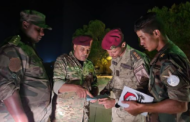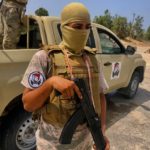MAIN EVENTS OF THE WEEK
On November 22, members of the Libyan House of Representatives (from Tripoli and Tobruk) held a special session in Rabat, Morocco at the invitation of the Moroccan Parliament in an attempt to help unite the Libyan Parliament.
Several governments as well as the UN hailed the LPDF’s agreement to schedule the next general elections for December 24, 2020.
UN Sec-General António Guterres informed the Security Council of his intention to appoint Nickolay Mladenov, as his new special envoy to Libya.
AL-WATIYA – MISRATA
- Itamilradar, an Italian website that monitors military aircraft movement over the Mediterranean Sea, has intercepted on November 21 two Turkish Air Force flights between Libya and Turkey: one departed from Al-Watiya at 08:33 CET, the other one from Misrata at 08:20 CET.
BENGHAZI
- on November 22, the GNA Sirte-Jufra Operations Room reported they had detected massive military mobilization of Khalifa Haftar’s forces in Benghazi and other east Libyan cities towards western Libya. Other movements reportedly were detected at the port of Sirte and in Jufra, prompting suspicions about Haftar’s good will in maintaining the ceasefire;
- on November 19, the LNA 660th Infantry Battalion announced that it would take part in a massive security operation in Benghazi ordered by Marshal Haftar himself and aiming to restore order in the city after several kidnappings and targeted killings in the past few weeks.
SIRTE
- on November 18, the GNA Libyan army declared that Russian Wagner and Janjaweed mercenaries are still digging trenches in Sirte, and are stationed in Jufra and Hun;
- on November 18, the GNA Sirte-Jufra Operations Room confirmed that the opening of the road between Sirte with Misrata depends on the withdrawal of Haftar’s forces and foreign mercenaries from Sirte, as well as on the removal of mines.
TARHOUNA
- on November 20, dozens staged a peaceful protest demanding to know the truth about the fate of their relatives and friends, who had been abducted and presumably killed by Haftar’s militias, especially the infamous Al-Kaniyat militia. The General Authority for Search and Identification of Missing Persons has uncovered at least three mass graves in Tarhouna and retrieved at least 115 bodies since April, 2019.

INTERNATIONAL RELATIONS
- on November 22, members of the Libyan House of Representatives (from Tripoli and Tobruk) held a special session in Rabat, Morocco at the invitation of the Moroccan Parliament in an attempt to help unite the Libyan Parliament;

- on November 20, 113 Nepali Army peacekeepers under the command of Major Himachal Jung Shah left for Libya to replace the second batch of the Special Guards Unit deployed in the peacekeeping mission;
- UN Secretary-General António Guterres informed the Security Council of his intention to appoint the now UN Special Coordinator to the Middle East, Nickolay Mladenov, a Bulgarian diplomat, as his special envoy to Libya;
- on November 20, EU High Representative for Security and Foreign Policy, Josep Borrell, stated the EU is ready cooperate with the UN to solve the crisis in Libya, and does not rule out sending a mission to monitor the ceasefire if the situation so requires;
- on November 20, Russia stopped the UN Sanctions Commission from blacklisting the pro-Haftar Al-Kaniyat militia and its leader, Mohammed al-Kani, for alleged human rights violations, saying the evidence brought forward is not conclusive;
- on November 19, the UNDP Resident Representative, Gerardo Noto, and the British Ambassador to Libya, Nicholas Hopton, signed an agreement by which the UK donates GBP 300,000 to the UNDP Political Dialogue Programme to support UN-facilitated Libyan Political Dialogue Forum;
- the US Congress has adopted on November 19 the Libya Stabilization Act, which includes several penalties against those who committed financial or war crimes, smuggling, or contributed to facilitating regional interventions or money laundering;
- on November 19, Turkish Defence Minister, Hulusi Akar affirmed his country’s firm support to the GNA during a speech at a virtual international conference on Libya organized by the Turkish think tank SETA and attended, among others, by Libyan Defence Minister, Salah el-Din al-Namroush, and UNSMIL acting Head Stephanie Williams;
- on November 19, in her online briefing before the UN Security Council on the Libyan developments, Stephanie Williams expressed her optimism about the progress made in the Tunisian-based Libyan dialogue, saying she was pleased to report that real steps forward had been made thanks to the confidence-building measures package that was formulated in Geneva;
- on November 19, UNSMIL published Libya’s political “Roadmap for the Preparatory Phase of a Comprehensive Solution” guiding the ongoing 75-member Libya Political Dialogue Forum (LPDF) talks that ended their face-to-face phase in Tunis 19-15 The detailed document underlines that any new roadmap would be within the 2015 Skhirat Libyan Political Agreement and Libya’s 2011 Transitional Constitutional Declaration and its amendments;
- on November 19, Italy’s Foreign Minister, Luigi Di Maio, spoke on the phone with Stephanie Williams to discuss the latest developments in Libya, and expressing satisfaction with the Libyan roadmap in view of the elections scheduled for 24 December 2021;
- in a press release on November 19, China’s Foreign Ministry spokesperson, Mr. Wang Yi called on the concerned parties in Libya to guarantee the legitimacy of the cease-fire agreement signed in Geneva this last October and reinforced by the Libyan Political Dialogue Forum (LPDF) in Tunisia;
- on November 18, in an open letter published to UN Sec-General António Guterres and Acting UNSMIL head, Stephanie Williams, 56 of the 75 members of the Libyan Political Dialogue Forum (LPDF) demanded the expulsion of all those associated with the serious allegations of corrupt practices and the use of political money in connection with the nomination process for Libya’s next executive authority;
- on November 18, Libya’s Interior Minister, Fathi Bashagha, signed in Paris a memorandum of understanding to strengthen cooperation between the ministry and Idemia Group security company in the field of developing biometric systems as well as other security purposes;

- the Egyptian House of Representatives Speaker Ali Abdel Aal invited Libyan counterpart Aguila Saleh and Libyan parliamentarians to visit Egypt to discuss ways of political solutions to the Libyan crisis, according to Libyan media reports on November 18;
- on November 18, Libyan Foreign Minister, Mohamed Sayala, held discussions with EU Ambassador to Libya, José Sabadell, along with the Commander of Operation Irini, R. Adm. Fabio Agostini, regarding the possibility of resuming negotiations on the cooperation agreements between Libya and the EU in various fields;
- on November 18, Spain has welcomed the agreement reached in the Libyan Political Dialogue Forum (LPDF) in Tunis to hold presidential and legislative elections on December 24 next year;
- on November 18, the GNA accord confirmed that Fayez al-Sarraj will resign after establishing a new executive authority in Libya. The spokesperson of the Prime Minster, Ghaleb Alzgalay, confirmed that Al-Sarraj will hand over jurisdiction after choosing a new executive authority following the end of the Libyan Political Dialog Forum. Al-Sarraj declared at the beginning of September that he will resign by the end of October in case the Libyan parties agree on a new body of governance, but he withdrew from resignation as no agreement was reached in this respect;
- on November 17, Germany’s ambassador to Libya, Oliver Owcza, said in a tweet that the participants in the Libyan Political Dialogue Forum (LPDF) held in Tunisia “agreed on substantial steps towards a unified Libya”, stressing the importance of “keeping the momentum for final decisions”;
- on November 17, GNA Interior Minister, Fathi Bashagha, held discussions with the EU Ambassador to Libya, José Sabadell, on security cooperation against terrorism. The EU Ambassador expressed the EU’s desire to support the Ministry of the Interior, particularly in combating terrorism and organized crime;
- on November 17, Fayez al-Sarraj welcomed the agreement reached by the participants in the Libyan Political Dialogue Forum in Tunis regarding setting a date for holding presidential and legislative elections on December 24 next year;
- on November 16, the U.S. Embassy in Libya welcomed the agreement reached during the Libyan Political Dialogue Forum (LPDF) in Tunis to hold national elections on December 24, 2021;
- on November 16, NOC head Mustafa Sanalla revealed plans to create a new protection force that includes civil and military forces, according to specific criteria. In a press conference in Brega with the UN envoy for Libya, Stephanie Williams, Sanalla said that oil installations will be guarded by three forces, consisting of industrial security, a new protection force and, the army;

- on November 16, GNA PM Fayez al-Sarraj met a Maltese government delegation, including Foreign Minister, Evarist Bartolo; Interior Minister, Byron Camilleri; and the Ambassador of Malta to Libya, Charles Saliba. The meeting discussed the implementation steps of the joint cooperation program agreed upon between the two parties, in economic and service fields, according to the media office of the Presidential Council. The talks also touched on the memorandum of understanding signed between the two countries in the field of combating illegal immigration;
- on November 16, GNA Defense Minister, Salah al-Namroush, discussed with Malta’s Interior Minister, Byron Camilleri, and his accompanying delegation the methods to support SaR operations in the Mediterranean and strengthen cooperation between the Libyan Ministry of Defense and its Maltese counterpart;

- on November 16, High Council of State head, Khaled al-Mishri, discussed with the Maltese Minister of Foreign Affairs, Evarist Bartolo, how to strengthen bilateral cooperation. Al-Mishri also handed the Maltese minister a written communication in which he expressed his appreciation to the President of Malta for his country’s “positive role” in resolving the Libyan crisis and making the political dialogue a success.
























